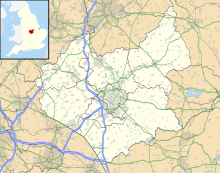RAF Wymeswold
This article needs additional citations for verification. (April 2012) |
RAF Wymeswold | |||||||||||||||||||
|---|---|---|---|---|---|---|---|---|---|---|---|---|---|---|---|---|---|---|---|
| Summary | |||||||||||||||||||
| Airport type | Military | ||||||||||||||||||
| Owner | Air Ministry | ||||||||||||||||||
| Operator | Royal Air Force | ||||||||||||||||||
| Location | Wymeswold, Leicestershire | ||||||||||||||||||
| Coordinates | 52°47′35″N 001°07′36″W / 52.79306°N 1.12667°W | ||||||||||||||||||
| Map | |||||||||||||||||||
 | |||||||||||||||||||
| Runways | |||||||||||||||||||
| |||||||||||||||||||
RAF Wymeswold is a former Royal Air Force station located 3.5 miles (5.6 km) north-east of Loughborough, Leicestershire, England. The airfield is situated between Hoton, Wymeswold and Burton on the Wolds, lying in the current district of Charnwood.
History
It was opened on 16 May 1942 during the Second World War and was home to Vickers Wellington bombers amongst others. It was not used for operations over Germany, but for training. It initially trained bomber pilots until 1944, then was taken over by RAF Transport Command, to train Douglas Dakota pilots.
RAF Castle Donington was used as a satellite airfield which post-war has turned into East Midlands Airport.
Post-war
From 1949 it was part of Fighter Command, flying Spitfires until 1950, then Meteors, although the aircraft were flown by the Royal Auxiliary Air Force. The RAuxAF was disbanded on 10 March 1957, which led to the closure of the airfield, after it had served as a satellite station of RAF Syerston for its BAC Jet Provost training aircraft.
Closure
It was closed as an RAF station in early 1957, although it continued to be used for aircraft maintenance by various private organisations until 1968.
It did not close as an RAF Base in 1957 as RAF Syerston still used it as a satellite airfield in 1963.
Based units
During the Second World War the airfield was home to Operational Training Units, however post war the airfield was used by squadrons flying new jets like the Hawker Hunter.
- No. 28 Operational Training Unit (OTU) (part of 93 Group, Bomber Command) from May 1942 until October 1944 using the Short Stirling, Handley Page Halifax and the Avro Lancaster.[1]
- No. 108 OTU (44 Group, Transport Command) from 15 October 1944 until August 1945 before being turned into No. 1382 Operational Conversion Unit RAF (4 Group) operating until December 1947 using the Airspeed Oxford, Miles Magister and the Dakota.
- 504 Sqn (12 Group, Royal Auxiliary Air Force) from 3 May 1949 until 12 February 1957 flying the Gloster Meteor Mk.8
- 664 Sqn (1969 Flight) from July 1954 until 10 March 1956.
- 56 Sqn from August 1955 until 1957 with the Hawker Hunter.
- 257 Sqn and 263 Sqn (temporary base from RAF Wattisham) using the Hawker Hunter.
Current use

The airfield is now disused although many of the original buildings remain and there is currently an industrial estate on the site; the runway still exists and is used for motorsport.
The airfield is home to the UK's largest solar farm. [2]
The entire airfield and associated buildings lie completely outside the civil parish of Wymeswold, with the north half being in Hoton, and the southern half in Prestwold. On the eastern fringe of the airfield is the Wymeswold Industrial Estate, where there is a go-karting facility. The Hoton-Wymeswold road runs alongside the airfield.
The airfield has also been host for regattas of land sailing.
In the early 1990s, there were plans for a 6,000 population new town to be built on the airfield.
Accidents and incidents
- On 14 April 1944 at around 16.30, Airspeed Oxford LB415 from 1521 Flight from the airfield collided with Avro Lancaster W4103 RC-E, from the 5 Lancaster Finishing School at RAF Syerston, over the Nottinghamshire village of Screveton.
- On Saturday 7 July 1951, a Meteor from the airfield, piloted by Pilot Officer H Elliot (RAuxAF) exploded in the air, killing the pilot.
See also
References
- ^ "RAF Wymeswold". Control Towers. Retrieved 11 April 2012.
- ^ "Solar farm". Retrieved 31 January 2014.

